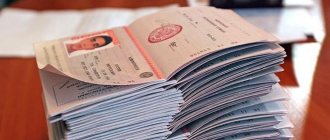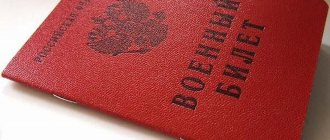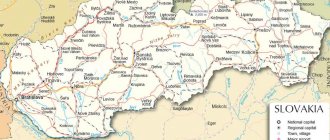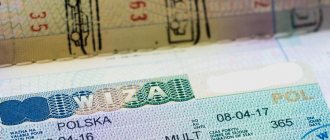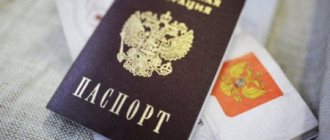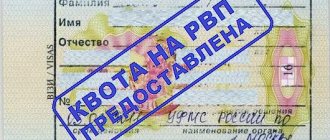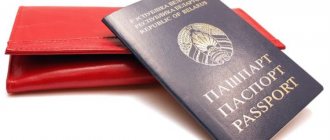292 thousand residents of Donbass have passports of the DPR and LPR (192
thousands of DPR passports,
100
thousand LPR passports) “If it is not possible to return home, it is enough to come to the migration department and describe your situation so that a decision can be made to extend the period of legal stay on the territory of Russia,” explains the head of the Main Directorate for Migration Issues of the Russian Ministry of Internal Affairs, General Police Major
Olga Kirillova
. — I mean the DPR and LPR. It’s more difficult with Ukraine, because we must understand that both those with good intentions and provocateurs are coming to us.” According to Kirillova, before making a decision on a particular Ukrainian, law enforcement officers draw up an objective profile of him.
The period of stay for immigrants from Donbass is extended every three months, for which you need to contact the migration division of the Ministry of Internal Affairs. The decision is made by the heads of these departments at their own discretion. Therefore, not everyone is able to use this mechanism. This is the result of the notorious human factor, when the objective assessment of the migrant’s situation is influenced by the personal beliefs of the boss or other subjective factors.
The Ministry of Internal Affairs knows firsthand about the distortions of the system in the migration structure and does not shy away from responsibility. “We receive a lot of complaints about our employees,” said Olga Kirillova. She called for solving such problems by moving vertically: if they have not been resolved at the district level, you need to contact the head of the Internal Affairs Directorate of the subject, if he does not respond, to the Main Directorate for Migration Issues of the Ministry of Internal Affairs of Russia. Above the Main Directorate for Migration Affairs of the Ministry of Internal Affairs there is the Minister of Internal Affairs, and this structure is also supervised by the First Deputy Minister.
“More than one departmental document was sent to the land in order to pay more attention to this particular category of immigrants. These people cannot be treated the same as migrant workers. These are different categories,” emphasizes Olga Kirillova.
Obtaining Russian citizenship by residents of Donbass in 2021
OUR REFERENCE According to the State Statistics Service of Ukraine, as of January 1, 2014, more than 6.5 million people
: in the Donetsk region - about
4.3 million people
, in the Lugansk region -
2.2 million people
.
3.8 million
people
remain in both republics 2.3 million
in the DPR and about
1.5 million
in the LPR.
The republics occupy approximately a third of the territory of the entire Donbass, but it is in them that the former regional centers and current capitals are located - Donetsk and Lugansk, where the concentration of the population has always been higher. Russian statistical services keep a general count of Ukrainian residents who have entered Russia, without singling out Donbass separately. In total, in 2021, more than 1.8 million
visitors from Ukraine and Donbass were registered temporarily at their place of stay, according to data from the Ministry of Internal Affairs.
Every month the patent owner must pay an advance payment of personal income tax. Its cost varies in regions. The cheapest patent in Adygea is 2,023 rubles
per month, the most expensive is in the Yamal-Nenets Autonomous Okrug,
8,354 rubles
.
In Moscow, the monthly payment is 4,500 rubles
, in St. Petersburg -
3,500 rubles
, in Krasnodar -
3,613 rubles
. To apply for a patent, you need to undergo a medical examination and pass an exam on knowledge of the Russian language, history and legislation of Russia. You also need to apply for a voluntary health insurance policy and pay a state fee. All these are paid services, their cost also depends on the region. Before a patent is issued, you must immediately pay for the first month of its validity. If the problems of a long stay in Russia are due to circumstances directly related to hostilities, then employment issues are correlated with financial well-being, which migrants from a region with a destroyed economy simply do not have. “To work legally, you need a patent. Its design costs money. In Moscow, for example, under 16 thousand rubles. I don’t mind paying for the patent itself every month, but I have nowhere to get 16 thousand. We have to make do with illegal part-time jobs,” shares Daria.
Many Russians do not understand why migrants cling so stubbornly to Russia. They say that in the cities of the DPR and LPR, except for those close to the front line, life is relatively peaceful - why don’t people return there? “Our standard of living is very low,” explains displaced Daria. “There’s practically no work, and if you find something, you’ll only get pennies.” In the republic, average salaries are 5-7 thousand rubles. And Russian salaries allow us to feed ourselves and send something home.”
In this regard, there is a serious lack of systems for transferring money to the republics, the girl complains. You have to transfer it through friends, bus drivers, or come up with other “makeshift” methods. Daria cited the example of migrants from Kyrgyzstan, who became almost the foundation of the country’s economy. As the Central Bank reported, in the first quarter of this year, Kyrgyz people transferred $434 million to their homeland. “If a third of this money were sent to our republics, they would somehow come to life,” the girl dreams. “After all, there are many Donetsk people here who could periodically send small sums to their relatives, but there is no opportunity.”
For most of the displaced people, staying in Russia and working here is the only way, Daria claims. “Believe me, we don’t mind paying taxes on salaries, we want to work honestly, pay tribute to our great Motherland, and benefit it. But due to difficulties with registration, we end up as a gray mass on a bird’s license,” she sums up the sad result.
“Residents of the Donetsk and Lugansk People’s Republics are in a very difficult situation, we understand this very well. It’s dangerous to live there, it’s hard to find work, and the wages are low. Therefore, many people are forced to leave for Russia,” states Sergei Tsekov, a member of the Federation Council Committee on International Affairs.
According to him, many of the Donetsk migrants still apply for patents, but they manage to do so at the cost of great hardship. Because of this, some decide to return, while others remain to work illegally. “But all these options are wrong,” the senator is convinced. “Residents of Donbass should be able to calmly come and work here, be ordinary taxpayers, like Russians.”
Guided by these considerations, a group of senators and deputies developed two bills - a kind of “special status” for citizens of the DPR and LPR, facilitating their situation in Russia. The first draft proposes to abolish the restriction on the length of stay of migrants, the second - the need to obtain a patent for employment. Amendments to Federal Law No. 115 “On the legal status of foreign citizens in the Russian Federation” apply to migrants who have documents issued in the Donbass republics.
“We must, to a certain extent, pass the point of no return: citizens of the DPR and LPR must enjoy the same rights as citizens of the Russian Federation. Yes, they do not have a Russian passport, but, nevertheless, they must freely come to Russia, stay here as long as necessary, and work without any permits. Otherwise, we are putting them in absolutely unacceptable conditions,” says one of the authors of the initiatives, a member of the Committee for Public Support of Residents of the South-East of Ukraine under the Federation Council, State Duma deputy Andrei Kozenko
.
In April, bills to simplify the stay and employment of citizens of the DPR and LPR in Russia were submitted to the State Duma. They are scheduled to be considered in the first reading in July. Until June 22, feedback was collected; in total, more than 50 decisions were received - from the Federation Council, from governors, legislative assemblies of republics, regions and territories. The Moscow region and the Republic of Mari El were definitely against it.
The doubts of the Moscow Regional Duma are related to security issues. “We consider the initiative to be premature until a mechanism is created to verify the authenticity of documents issued in the DPR and LPR. Today we do not have such a mechanism, which is why we refused to support these initiatives. We have facts that under the guise of refugees from the republics, people arrive with unseemly intentions, simply spies, terrorists,” said Nikolai Cherkasov,
.
He refused to give specific examples, citing the impossibility of disclosing operational information. However, the authors of the initiative do not consider such arguments serious. “We have a mechanism for checking passports of the DPR and LPR,” Andrey Kozenko answers. — Residents of Donbass, on the basis of these documents, cross the border of the Russian Federation, stay here, get a job, check into hotels, and so on. These documents are checked at the border crossing stage.”
Some people believe that the Donetsk and Lugansk People’s Republics are “some kind of Limpopo,” the parliamentarian was indignant. Although this is not so: in these territories, state authorities have been created, courts, the prosecutor's office, the government, people's councils and other structures operate. “And if we talk about fakes, a passport of a citizen of the Russian Federation can also be faked so that it cannot be distinguished from the real one. Therefore, this is absolutely not an argument. Moreover, DPR and LPR passports are checked much more closely than Russian ones,” concluded Andrei Kolenko.
Until recently, for residents of the two republics of the DPR and LPR, the same law was in force, which applies to all other migrants coming to Russia - the 90/180 rule. But already at the end of December 2021, the Government of the Russian Federation received a Decree stating that citizens of the Donetsk and Lugansk regions of Ukraine (and this means only the territories at the disposal of the DPR and LPR) can stay in the Russian Federation for a continuous period of 180 days from the date of entry .
Sooner or later, all regions will synchronize in the implementation of the Resolution and will extend the deadlines for residents of the DPR/LPR to 180 days from the date of entry. But who exactly will this Decree apply to?
This Regulation applies to you if:
- you have a passport of the LPR or DPR;
- you have a foreign passport of Ukraine, but registration at the place of residence in the region is in the territory controlled by the DPR or LPR.
you have a foreign passport of Ukraine, but registration at the place of residence in the region is in the territory controlled by the DPR or LPR;
In any case, until the issue is fully resolved, contact your inspector. Only he will tell you how long the stay will be extended.
You can already find an explanatory letter from the Main Directorate for Migration Issues of the Ministry of Internal Affairs of the Russian Federation on the Internet.
More than 400 thousand residents of Donbass have already received Russian passports
Nothing has changed directly in the legislation of the Russian Federation on this issue, however, objectively, the new norms of the Law on Citizenship, by facilitating the procedure for staying in the Russian Federation and moving around the territory and obtaining citizenship, thereby facilitate employment.
Namely:
- LPR and DPR passports are recognized.
- Certificates and diplomas issued by educational institutions of the DPR and LPR have legal force in the Russian Federation.
- It is allowed to travel in vehicles that have license plates and are registered in the LDPR.
Thus, the changes introduced to the legislation significantly simplify the acquisition of Russian citizenship by citizens of the LDPR and improve their legal status in the Russian Federation.
As a result of the changes, obtaining Russian citizenship under the program of resettlement of compatriots is simplified, obtaining citizenship is simplified for some categories of citizens (citizens of the DPR and LPR are also included in this category), permission to travel by vehicle has been obtained, and employment requirements have been simplified due to the recognition of LPR and DPR passports , certificates and diplomas issued by our educational institutions.
In our opinion, these changes can be clearly assessed as improving the situation of our fellow countrymen - applicants for Russian citizenship. It should be noted that the President of Russia signed the Concept of Migration Policy until 2025. Many factors were taken into account during its development.
According to general rules, a foreigner can stay in Russia for a maximum of 90 days every six months. For residents of Donbass who left the country en masse, special conditions are provided in 2021. Divisions of the Federal Migration Service of the Russian Federation extend the period of stay as long as the crisis continues in Ukraine.
The period of stay is also extended:
- When registering a temporary residence permit, even if the documents are not ready, they are at the consideration stage.
- When applying for citizenship of a foreigner who has been recognized as proficient in Russian.
- If there is an application from the employer, if the Ukrainian is a highly qualified specialist.
- If there is a request from an educational institution where a foreign citizen receives vocational education.
- When employing foreign students studying full-time.
- When applying for refugee status.
- When providing temporary asylum.
- When a patent is issued.
For a temporary residence permit, a foreigner needs living quarters. This can be personal housing or rented. Each region of Russia has quotas for issuing temporary residence permits. Information on the number of free quotas is available from the migration service. Quotas are created mainly to regulate the flow of foreign labor. According to the law, a migrant can work in the region where the temporary residence permit was issued.
A temporary residence permit is valid for 3 years. The fee is 1600 rubles.
Categories of citizens who have the right to receive a temporary residence permit, regardless of the quota:
- Ukrainians born in Russia.
- Children of disabled parents who live in the Russian Federation.
- Spouses and disabled parents of citizens of the Russian Federation.
The foreigner must prove that he speaks the language. This rule also applies to residents of Donbass. List of documents accepted by the migration service as confirmation:
- Certificate of passing the exam. Testing is carried out in a specialized center.
- A Soviet-era school certificate or diploma of professional education. The latest date is 1991.
- Diploma from a Russian university or secondary school.
The exam is not taken by children under 18 years of age, pensioners, or participants in the resettlement program from abroad. Residents of Donbass who have requested a temporary residence permit are issued a certificate. It confirms that the holder is in the country legally. The application is considered no more than 2 months. After a year of owning a temporary residence permit, a Ukrainian has the right to request a residence permit in Russia.
A residence permit is the final stage on the path to citizenship. The foreigner submits the application during the validity period of the temporary residence permit, starting from one year. Cash contribution – 3500 rubles.
Documents for obtaining a residence permit:
- Identification.
- Confirmation of housing availability.
- Confirmation of income not lower than the subsistence level or a document of incapacity for work.
- Medical certificate confirming the absence of infections and drug addiction.
- Certificate of knowledge of the Russian language (except for categories of citizens who are exempt from the exam).
Residence permits are issued for 5 years. Allowed to renew an unlimited number of times. Residence permit holders receive most of the rights granted to Russian citizens, including the opportunity to re-register a pension and receive payments.
Ukrainians who speak Russian can obtain a residence permit in a special manner. This is an innovation that has been in effect since 2014 after the approval of the relevant Federal Law. It affected a large number of residents of Donbass, for whom the language is native.
According to the Federal Law of the Russian Federation “On Citizenship”, the period of compulsory residence in Russia to obtain citizenship from 5 years can be reduced to 1 year if:
- A foreigner has high achievements in the field of science, culture and technology and is interesting for Russia.
- The person was granted political asylum.
- The person is in refugee status.
Algorithm for obtaining citizenship according to a simplified scheme (except for the “Compatriot” and “Native Russian Language” programs):
- Apply for a residence permit.
- Submit documents for citizenship.
- Pay the state fee - 3500 rubles.
- Wait 6 months.
Applications of foreigners who fall under resettlement programs or are recognized as “native speakers” of the language are considered within 3 months.
Applications of foreigners who fall under resettlement programs or are recognized as “native speakers” of the language are considered within 3 months.
There is a very serious problem related to the legal status of the residents of Donbass. Ukraine does not need citizens of the DPR and LPR. And obtaining Russian citizenship using the standard procedure is too long and troublesome.
What opportunities are there for residents of the South-East of Ukraine in terms of obtaining Russian passports? If foreigners do not have the right to permanent or temporary residence in the Russian Federation, they can work legally only if they receive or.
The main condition for obtaining a Russian passport is the presence of registration in the territories of the republics. If a person has not been registered since 2014, then the fact of residence must be proven in local courts. This is extra time and an additional waste of money. It is worth mentioning that we are talking about obtaining a Russian passport by residents of Donbass without a temporary residence permit or residence permit.
When people began to prepare documents, they were faced with the need to restore evidence and prove family ties, but archival data in the republics is scarce and many records are missing. Also, the Russian spelling of surnames and names in different documents of the same family often differs. It is difficult to restore all this and prove your relationship.
Citizens of the Russian Federation cannot move around the territory of Russia with a Ukrainian or LDPR driver’s license, and a car with license plates of a foreign country requires customs clearance.
And this is just the tip of the iceberg called “Russian passport for Donbass.” What awaits citizens in the future, time will tell, but the first information is already emerging that all data on obtaining a second citizenship is secretly transferred to Ukraine.
- Peskov: Russia did not recognize the passports of the DPR and LPR
- Deputy: “Do the Russian people of Donbass really not deserve Russian passports?”
- Russian passports for residents of the LDPR: to be or not to be?
- Zakharchenko did not rule out issuing Russian passports to the DPR
- LDPR passports have become de facto residence permits in the Russian Federation - Babitsky
Thousands of residents of the DPR and LPR require a migration amnesty
To combat the demographic crisis, the Russian authorities decided to simplify the procedure for obtaining Russian passports. For example, foreigners will no longer be required to renounce their previous citizenship. According to human rights activists, these relaxations will only affect those who are in Russia legally. But for many thousands of people, primarily from Ukraine, who violated migration laws, sometimes through no fault of their own, an amnesty is necessary.
The “Forecast of Socio-Economic Development for 2021,” which the government submitted to the State Duma, proposes to eliminate the mandatory requirement of “renunciation of other citizenship for foreign citizens accepting Russian citizenship.” The authorities thus expect to compensate for the “natural” population decline in 2020–2023 with the help of migration growth.
In about a month, amendments to the law will come into force, allowing foreigners who have relatives in Russia to quickly obtain a residence permit (RP), bypassing the stage of a temporary residence permit (TRP). Usually, it is these procedures that delay the process of obtaining a Russian passport for a long period of time.
Human rights activists, in turn, note that after the spring presidential decrees, access to Russian citizenship was indeed noticeably simplified. But this is only for those who are in the country legally. But those tens of thousands of people who, most often through no fault of their own, violated migration legislation, still remain outside of these relaxations. For them, for example, the problem of deportation from Russia due to overstaying the permitted period of stay is pressing, although few of them have committed any serious offenses that impinge on the security of the country. Moreover, most of these people actually have close relatives in Russia and came here to live and work next to them.
“In fact, there are still a lot of gaps that need to be corrected both in legislation and in the practice of migration authorities,” Alexandra Dokuchaeva, deputy head of the Institute of CIS Countries, told NG. For example, many Ukrainians currently find themselves thrown out of the legal field, since for obvious reasons they cannot renew, restore or obtain documents in their homeland. “Also, a large number of refugees from Ukraine found themselves in an illegal situation due to exceeding the period of permissible stay in the Russian Federation. They are afraid to contact migration authorities, because they will face trial, and then expulsion from the country and a ban on re-entry,” Dokuchaeva explained. According to her data, we are talking about tens of thousands of people.
At the same time, there are also thousands of people in the Russian Federation with DPR and LPR passports who have committed minor offenses here and now cannot return back, fearing that they will be detained at the border, and therefore deprived of the way back to Russia. “Even after returning to their republic, they will no longer be able to obtain Russian citizenship, since they have a criminal record,” Dokuchaeva noted. So, in her opinion, there is only one way out of the situation - holding a migration amnesty. However, the Russian authorities do not agree to it in any way.
For example, a bill on such an amnesty, introduced by United Russia deputy Konstantin Zatulin, has been in the State Duma without movement since last summer. By the way, his own initiative to ban the confiscation of passports from Russians that were invalid due to the mistakes of the officials themselves has also been frozen. Dokuchaeva reported that the extrajudicial seizure of passports, which the Ministry of Internal Affairs suddenly recognizes as incorrectly issued, continues. Despite the promises of the department itself and last year’s decision of the European Court of Human Rights on the illegality of such actions against citizens of the Russian Federation.
“It is not the fault of the people themselves, they worked, paid taxes, but suddenly the authorities discover that their documents are in order. Children, along with adults, also fall under this “skating rink”, despite the fact that they were born in Russia,” Dokuchaeva recalled. The authorities, of course, have provided for a simplified acquisition of citizenship for those disenfranchised who received a passport before January 2010, but for some reason there is no such opportunity for those who received it later. At the same time, the Constitutional Court of the Russian Federation has repeatedly expressed demands to check whether a person at the time of acquiring citizenship had grounds to obtain it.
“Another problem that no one is solving is the citizenship of children whose parents are from different countries. For example, there are many cases when parents are abroad, and in this case the child will not be granted Russian citizenship without the consent of the other parent. This is where the tragedies of many women arise who cannot take their children away from their foreign husbands,” Dokuchaeva emphasized. She suggested that after the government initiative on all foreigners, the State Duma will become more active, and the authorities themselves “at least will no longer create obstacles to the passage of those bills that our compatriots are counting on today.”

